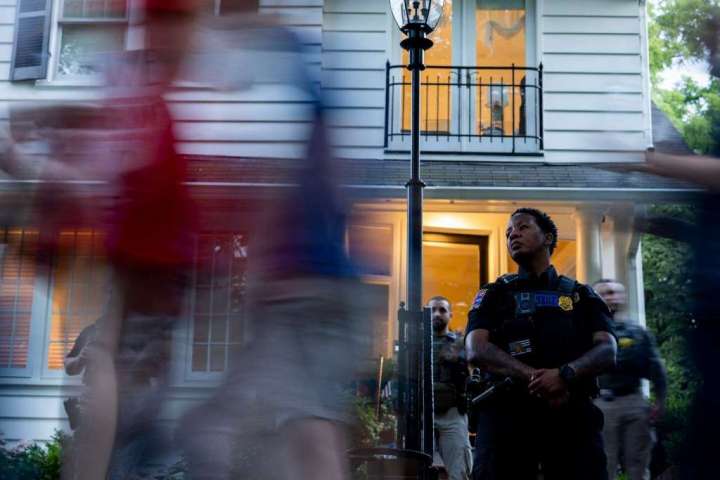The Supreme Court’s chief security officer has penned letters requesting that top Maryland officials direct police to enforce laws “that squarely prohibit picketing at the homes of Supreme Court Justices” following weeks of protests outside their houses in Montgomery County.
Supreme Court marshal asks Md. leaders to enforce anti-picketing laws

“For weeks on end, large groups of protesters chanting slogans, using bullhorns, and banging drums have picketed Justices’ homes in Maryland,” the letter to Hogan said. “Earlier this week, for example, 75 protesters loudly picketed at one Justice’s home in Maryland for 20-30 minutes in the evening, then proceeded to picket at another Justice’s home for 30 minutes, where the crowd grew to 100, and finally returned to the first Justice’s home to picket for another 20 minutes. This is exactly the kind of conduct that the Maryland and Montgomery County laws prohibit.”
The marshal cited Maryland law, which states that “[a] person may not intentionally assemble with another in a manner that disrupts a person’s right to tranquility in the person’s home” and that law “provides for imprisonment for up to 90 days or a $100 fine.”
The letters dated July 1 also cite a Montgomery County law that says “[a] person or group of persons must not picket in front of or adjacent to any private residence,” and a law that says a group can march in a residential area “without stopping at any particular private residence.”
Abortion rights advocates had originally taken to the streets outside the justices’ houses after the draft of an opinion by the Supreme Court signaling that it planned to overturn Roe v. Wade was leaked to Politico in May. Protesters continued gathering outside the homes again in June when the 49-year-old decision that guarantees a person’s constitutional right to abortion was officially over turned.
Following the release of the leaked draft, but before the court issued its opinion in Dobbs v. Jackson Women’s Health Organization, a California man was arrested near Justice Brett M. Kavanaugh’s home in Chevy Chase and charged with attempting to kill a judge. Nicholas Roske, is accused of flying to Maryland with a gun and burglary tools with plans to break into Kavanaugh’s home to kill him. Prosecutors said he was angry over the leaked draft and the recent school shooting in Uvalde, Tex. Roske has pleaded not guilty.
“Maryland and Montgomery County laws provide the tools to prevent picketing activity at the Justices’ homes, and they should be enforced without delay,” said one of the letter’s from Curley, who is also leading the investigation into the Politico leak.
The ongoing demonstrations outside of justices’ homes have sparked legal debate over whether laws banning picketing outside of the private homes of judges are constitutional.
It was not immediately clear Friday whether officials or law enforcement had received the marshal’s letter or how they intend to respond to the request.
Maryland State Police, the Montgomery County Police Department, spokespeople for Hogan and Elrich, and the Supreme Court of the United States did not immediately respond to requests for comment about the letter on Friday night.
The Montgomery County Police Department website says on its homepage: “The Montgomery County Department of Police is committed to preserving the first amendment rights of all individuals wishing to participate in peaceful, lawful, protest and assembly,” and links to a list of protest laws “to assist in educating the community,” including those cited in the Supreme Court marshal’s letters.
“Peaceful, lawful protest and assembly is a cornerstone of our democracy,” the document on the county police website reads.
Curley’s letters quoted previous comments from Hogan and Elrich regarding protests at justices’ home, including a statement from a Hogan news release saying, “We will continue to partner with both federal and local law enforcement officials to help ensure these residential areas are secure.”
In the letter addressed to Elrich, Curley said a request was made in May to the county police department about enforcing the Montgomery County ordinance.
The letter also quoted a news report in which a Montgomery County official said people “can’t statically protest in front of someone’s house for political reasons” and protesters are generally told they have to be moving and can’t stay in a single place for an extended period of time. It also quoted a letter published in The Washington Post from the author of the county ordinance urging the county executive and police department to enforce the law.
“It is against the law in Montgomery County to picket at a person’s home for an issue that is about a person’s work,” said the letter, quoting former councilwoman Gail Ewing.






